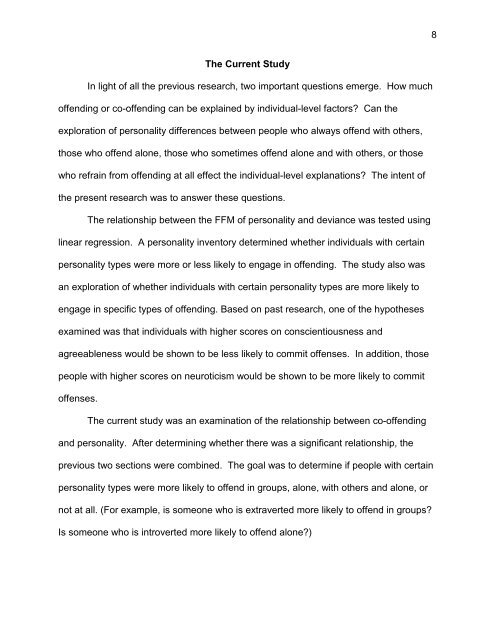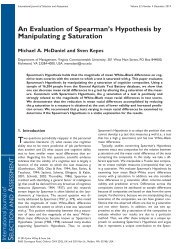- Page 1 and 2: PERSONALITY AND CRIME: AN EXAMINATI
- Page 3 and 4: iiiIndiana University of Pennsylvan
- Page 5 and 6: vThe results contribute to the body
- Page 7 and 8: viiDr. David Myers, I know you were
- Page 9 and 10: ixsupport me. You have made me feel
- Page 11 and 12: xiChapterPageMethods ..............
- Page 13 and 14: xiii21 OLS Regression Results Measu
- Page 15 and 16: 2variables. Participants were also
- Page 17 and 18: 4crime (Bartol & Holanchock, 1979;
- Page 19: 6incarcerated, while everyone who i
- Page 23 and 24: 10offending and review past researc
- Page 25 and 26: 12brief examination of a few of the
- Page 27 and 28: 14With the passing of time, it is n
- Page 29 and 30: 16phenomenon, not a social problem.
- Page 31 and 32: 18Goldberg (1981) examined the lexi
- Page 33 and 34: 20when arousal is increased or decr
- Page 35 and 36: 22Review of Relevant LiteratureThou
- Page 37 and 38: 24results only reported on the diff
- Page 39 and 40: 26conscientious, they were less lik
- Page 41 and 42: 28While this study appeared to addr
- Page 43 and 44: 30from the general community. The r
- Page 45 and 46: 32higher conscientiousness scores.
- Page 47 and 48: 34statistics were used in evaluatin
- Page 49 and 50: 36separated based on their scale sc
- Page 51 and 52: 38robbery convictions and no more t
- Page 53 and 54: 40the study made use of a non-delin
- Page 55 and 56: 42Sample 2 was comprised of 124 mal
- Page 57 and 58: 44NeuroticismNumerous studies have
- Page 59 and 60: 46review include a mix of data sour
- Page 61 and 62: 48According to the data, solo offen
- Page 63 and 64: 50with a crime. However, this did n
- Page 65 and 66: 52In 1977, Erickson teamed up with
- Page 67 and 68: 54of theft, burglary, and motor veh
- Page 69 and 70: 56populations utilized in the resea
- Page 71 and 72:
58discussed. The quantitative metho
- Page 73 and 74:
60behavior, and lay the foundation
- Page 75 and 76:
62Ha3: There is a significant, posi
- Page 77 and 78:
64Ha6: Individuals with higher scor
- Page 79 and 80:
66Table 2Hypothesized Relationship
- Page 81 and 82:
68item are between 1-5 on a Likert
- Page 83 and 84:
7016. Generates a lot of enthusiasm
- Page 85 and 86:
72likely to be offended. Drunkennes
- Page 87 and 88:
7433 true-false questions, asking a
- Page 89 and 90:
76SampleIn a vast majority of prior
- Page 91 and 92:
78(Appendix C). Once the survey was
- Page 93 and 94:
80Finally, there is an issue of ano
- Page 95 and 96:
82earlier, this model is the most w
- Page 97 and 98:
84Phase 2In this phase of the resea
- Page 99 and 100:
86While the six types of offending
- Page 101 and 102:
88Since this statistic needed overa
- Page 103 and 104:
90CHAPTER FOURRESULTSThe current re
- Page 105 and 106:
92Table 4Comparison of Descriptive
- Page 107 and 108:
94alpha reliabilities for the Big F
- Page 109 and 110:
96observation, and further points o
- Page 111 and 112:
98Extraversion. Extraversion refers
- Page 113 and 114:
100further, the alpha if deleted ma
- Page 115 and 116:
102Table 10Descriptive Statistics f
- Page 117 and 118:
104personality research. As mention
- Page 119 and 120:
106would actually be higher if this
- Page 121 and 122:
108Offenses against persons. Offend
- Page 123 and 124:
110Table 14Descriptive Statistics o
- Page 125 and 126:
112only comprised of responses from
- Page 127 and 128:
114Validity of the offending and co
- Page 129 and 130:
116When looking at the correlations
- Page 131 and 132:
118According to Lewis-Beck (1980),
- Page 133 and 134:
120Ordinary least squares regressio
- Page 135 and 136:
122independent variables are includ
- Page 137 and 138:
124variables in the model, we fail
- Page 139 and 140:
126negatively related to analogous
- Page 141 and 142:
128Table 24OLS Regression Results M
- Page 143 and 144:
130weight is openness (.115). The p
- Page 145 and 146:
132additional variables caused a re
- Page 147 and 148:
134Ha8: Individuals with higher sco
- Page 149 and 150:
136offending than individuals with
- Page 151 and 152:
138Phase ThreePhase 3 of the study
- Page 153 and 154:
140Table 32Multinomial Logistic Reg
- Page 155 and 156:
142offenders. Agreeableness also ap
- Page 157 and 158:
144SummaryWhen comparing across gro
- Page 159 and 160:
146CHAPTER FIVEDISCUSSION AND CONCL
- Page 161 and 162:
148causing property damage (Laak et
- Page 163 and 164:
150relationship between individual
- Page 165 and 166:
152Ha1: There is a significant, pos
- Page 167 and 168:
1542003). With this in mind, while
- Page 169 and 170:
156was found to be significantly an
- Page 171 and 172:
158significant relationships for co
- Page 173 and 174:
160LimitationsWhile this study does
- Page 175 and 176:
162well researched theories that ma
- Page 177 and 178:
164Recommendations for Future Resea
- Page 179 and 180:
166the solution to this problem. Cu
- Page 181 and 182:
168
- Page 183 and 184:
170Berman, T., & Paisey, T. (1984).
- Page 185 and 186:
172revitalizing the group premise i
- Page 187 and 188:
174Heaven, P. C. L. (1996). Persona
- Page 189 and 190:
176offenders. British Journal of Cr
- Page 191 and 192:
178psychology. Psychology, Crime &
- Page 193 and 194:
APPENDICES180
- Page 195 and 196:
182SURVEY INITIAL EMAILHello,My nam
- Page 197 and 198:
184SURVEY INVITATION EMAILHello,You
- Page 199 and 200:
APPENDIX C186
- Page 201 and 202:
188Indiana University of Pennsylvan
- Page 203 and 204:
190SURVEY THANK YOU EMAILHello,I wo
- Page 205 and 206:
192Part ISURVEY QUESTIONNAIREHere a
- Page 207 and 208:
194Part IIHere are a number of char
- Page 209 and 210:
196How often in the past 12 months
- Page 211 and 212:
198How often in the past 12 months
- Page 213 and 214:
200How often in the past 12 months
- Page 215:
202




